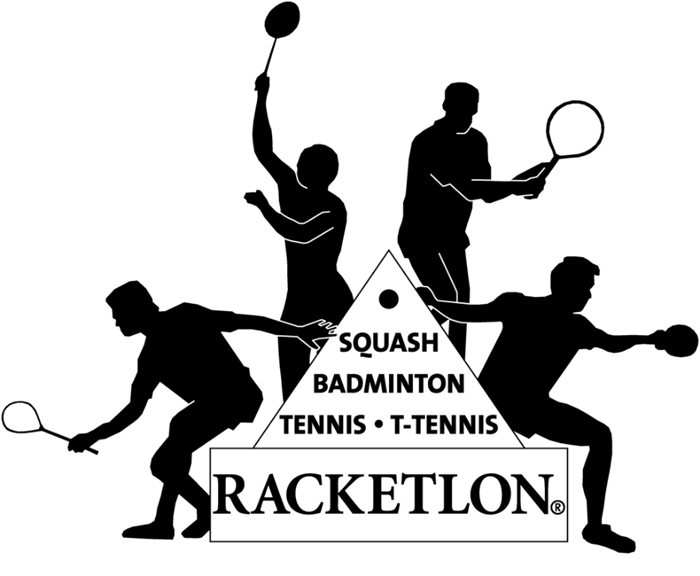
The original and official Racketlon logo. First used on the poster for the first Swedish Racketlon Championships in June 1990.
About the Racketlon Trademark
Date: 2012-11-27
(See also update attached below from 2013-11-18;
"Lennart Eklundh Becomes Co-owner of the Racketlon
Trademark")
(In addition, see update attached below from
2017-08-05; "Marcel Weigl Becomes Co-owner of the Racketlon
Trademark")
_________________

The original and official Racketlon logo. First used on the
poster for the first Swedish Racketlon Championships in June
1990.
Anyone who is familiar with the original Racketlon logotype and
has spotted the "R" symbol in it knows that Racketlon
is a registered trademark. We sometimes get questions regarding
this and here is an effort to address some of them and offer some
clarity - for organisers and everyone else interested. The topic
is especially relevant at present with the Racketlon World
Championships for the first time coming up in Stockholm, the home
city of Peter Landberg and the very place where the trademark was
born.
History of the Trademark
The name Racketlon was invented and trademarked by Sweden's Peter
Landberg as he started to run multi-racket tournaments in
Stockholm towards the end of the Eighties. At the first event in
1989 the name Racketlon did not yet exist. Instead it was
marketed under the name of Racketmästerskap (Swedish
for "Racket Championships"). But soon, inspired by the
"athlon" in triathlon, Landberg felt that the perfect
name for this new sport would be Racketlon.
When the name first came up, in 1989,
Landberg was in a restaurant at Norrmalmstorg in Stockholm with
his good friend Anders Wahlstedt (a former Swedish squash
champion); Landberg raised his hands in the air and shouted
"JAAAA!" as if he had won the gold. It then took a
while to figure out whether there should be an "h" in
there as in "Rackethlon" but in the end a Swedish
spelling conquered. Unfortunately the restaurant no longer
exists but racketletes interested in a pilgrimage should be
advised that it was located on Norrmalmstorg square in central
Stockholm. See picture below.
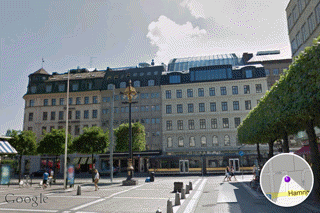
The house where Racketlon was born. It was in
one of these houses at the southern end of Norrmalmstorg that the
word Racketlon was first spoken. Exactly which house is not clear
at the moment. More research needed...
In September 1989 the name was trademarked
and then a logo was created that was used for the first time in
1990 for the first Swedish Racketlon Championships. That logo is
identical to the one above (with the single exception of
"T-TENNIS" replacing the Swedish word
"PINGIS") and still the official logo of Racketlon.
Landberg continuously, year after year, kept organising Swedish
Championships and other Racketlon tournaments - and developing
the concept (e.g. at an early stage adjusting the rules inspired
by Finnish multi racket tournaments, the rumour of which had
reached Stockholm) and the word kept spreading within the Swedish
racket communities. So, in 2001 an enthusiastic group of
Racketletes in Gothenburg decided to invite the community to a
first major tournament in their home city. And that tournament's
marketing officer, Hans Mullamaa, had the - in some people's
opinion - rather crazy idea of trying to market it
internationally and call it the "World Open". This
turned out above almost everyone's expectations as some (albeit
little more than a handful) foreigners actually arrived to play.
Bulgaria, Germany, France and Scotland were represented. But
above all Finland, who shocked the Swedish community by winning
all three of the major titles; both Elite events and the Men's
Veteran.
During the process Mullamaa made inspiring contacts in many parts
of the world and as the international potential of Racketlon
started to emerge in his mind an agreement was made with Landberg
through which they together would share ownership of the
trademark that was now also registered on the international
level. For Mullamaa that trademark agreement became the starting
point for a rather intense undertaking; in his own words he would
"live and breath" Racketlon for the next several years.
He initiated the International Racketlon Federation in 2002, the
Racketlon World Tour in 2003 and spent the next couple of years
expanding them as the president of the Federation. His main
marketing tool was Racketlon.com, a website that he started in
the spring of 2001 ahead of that first World Open and which
started to serve as the official homepage of the Federation at
its inception a year later.
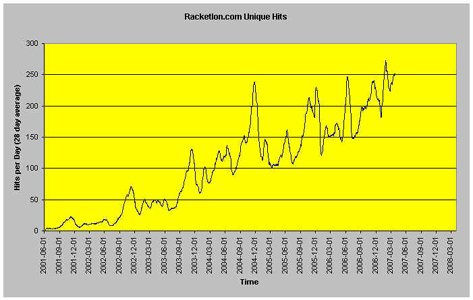
One perspective on Racketlon growth during the initial years.
The number of daily hits on Racketlon.com (on average over the
last 28 days). In parallell the number of web pages mentioning
the word "Racketlon" grew from 4(!) to 195 000.
As Mullamaa stepped down from the presidency at the end of 2005 to take on a more supportive role as member of the Council he was able to hand over an organisation that had grown to include 15 member states and a World Tour that (in 2006) contained 12 tournaments in 11 countries. Under his presidency Racketlon had become the first multi-racket sport to take place on the international level unifying the multi-racket traditions that existed in many different countries that had seemingly emerged independently at about the same time during the mid or late Eighties. Examples include the Mailapelit (eng: "Racket Games") of Finland, the King of Rackets of Belgium, the Vierschläger-turniere (eng: "Four Rackets Tournaments") of Germany, the Racket4s (pronounced "Racket-force") of Holland and the Championnat de Quatre Raquettes of France. As Racketlon.com was started in the spring of 2001 a search for the word "Racketlon" (on search engine AltaVista, the Google of that time) gave 4(!) hits, all in Sweden. In March 2007 that figure had increased to 195 000 (Google hits).
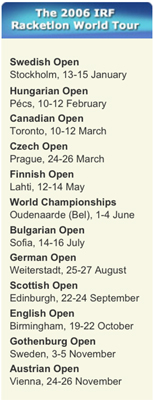

The main features of the present tour were more or less in
place in 2006.
2006: 12 tournaments in 11 countries.
2013: 14 tournaments in 12 countries.
Scotland out. Holland and Switzerland in.
Present Trademark Arrangement
In 2009, as the sport was progressing and generally becoming more
formalised, a written licensing agreement was made between the
Federation and the trademark owners that formally gave the
Federation (and by extension its members) the right to use the
trademark free of charge. The agreement took effect as of 2010
and is still valid at present. See full text below. Up until then
this licensing had been implicit - and, still, free of charge.
**********************************************
As the owners of the Racketlon trademark we hereby permit the FIR
to use the name "Racketlon" for marketing purposes
under the following condition:
The original Racketlon logotype (containing the "R"
symbolising "Registered Trademark") shall, as of
2010-01-01, clearly appear in all FIR marketing material and in
all marketing material for any FIR sanctioned event.
(The term "marketing material" is meant to include e.g.
posters, videos and websites. Approved versions of the logo are
available for download on http://www.racketlon.com/logos.html )
signed:
Peter Landberg & Hans Mullamaa
**********************************************
We understand that the fact that Racketlon is a privately owned
trademark may seem surprising or even strange to newcomers.
Especially since obviously none of the four sports that are
included in Racketlon share this feature. Indeed not many sports
do. There are examples but they are few; Formula One is one.
Another is Speedminton (that is about as young a sport as
Racketlon on the international level).
Perhaps it's true that the arrangement would have been more
fitting for the USA than for Europe (which is where the bulk of
Racketlon activity takes place at present) but we believe that
the fact that Racketlon is a registered trademark is a so called
"win-win". It's good for the sport. And it's good for
the owners of the trademark;
Good for the sport:
Incentive.
The whole idea with trademarks in general is to create incentive.
And it should be clear from the above history that the ownership
of the trademark has provided incentive to move the sport forward
at a time when there was little or no monetary incentives. For
Mullamaa, the international launch of Racketlon meant a work
effort (rather comprehensively documented on Racketlon.com)
corresponding to perhaps 20 hours per week over a period of a
couple of years. Unpaid. On his leisure. This is not to say that
the trademark provided his only incentive - but without it he
would certainly not have put in anything near the effort he did -
and probably not reached the level needed to make Racketlon an
international sport. Landberg, at an earlier stage, put in
similar amounts of work. Not as continuously intense perhaps but
over a longer period - over more than a decade starting at the
late Eighties. It can indeed be questioned whether Racketlon
would at all exist today had it not been for the trademark
incentive.
And, moreover, we believe that this trademark incentive can - and
should - be put to use in the future also. For the benefit of
Racketlon.
Good for the trademark owners:
For us the ownership of the trademark simply means a way to stay
involved and - possibly, at some time in the future when the
sport has grown further - a reasonable financial return on the
investments we have made. (Our intention is not to introduce any
licensing fees on local or national level. If and when we
introduce licensing fees our intention is that this will be done
on the international level.)
The Racketlon Logo
As stated in the licensing contract above the only requirement we
have on organisers is that they make good use of the official
Racketlon logo. We think of it as a great unifying marketing
asset for our sport. Immediately recognisable and effectively
telling the story of what Racketlon is it has even, after over 20
years of usage, become an iconic symbol.
We are aware that organisers have started to become rather
careless about using the logo but we hope that we can encourage
you to improve this thereby honouring the origins of our sport.
If you are an FIR sanctioned event it is even, as seen above, a
formal requirement to use it. And a contractual breach if you
don't.
______
In conclusion we hope that we, with the above, have cleared at
least some of the question marks that might have existed
regarding the Racketlon trademark (any remaining questions may be
addressed to info @ racketlon.com) and we humbly hope that
the Racketlon community will agree that the arrangements have
been of great benefit to our sport.
Peter Landberg
- inventor of the name Racketlon and the
original trademark owner
- original organiser of Racketlon events starting 1990
- 50% owner of the Racketlon trademark
Hans Mullamaa
- founder (2001) and owner of Racketlon.com
- initiator of Racketlon's first World Championship and Marketing
Officer of the first three World Championships (2001-2003)
- initiator of the International Racketlon Federation and its
first President (2002-2005).
- initiator of the Racketlon World Tour and its co-ordinator
during the first four years (2003-2006)
- 50% owner of the Racketlon trademark
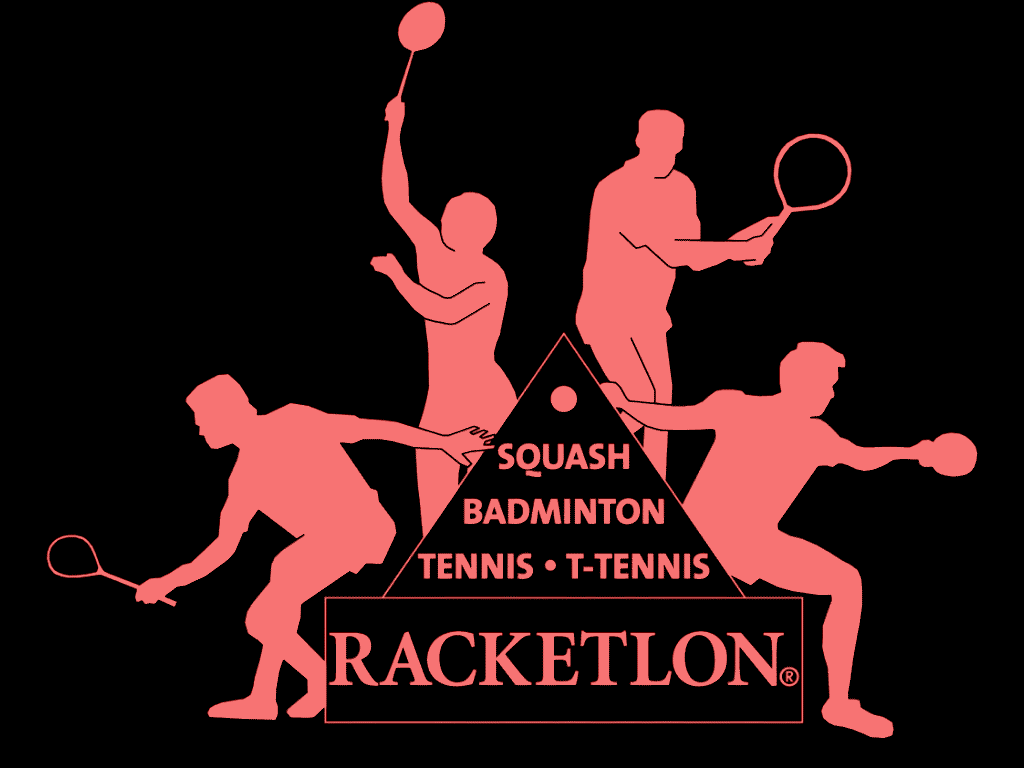
_________________________________
Update 2013-11-18:
Lennart Eklundh Becomes Co-owner of the Racketlon Trademark.
In connection with his World Championships in Stockholm last year
Lennart Eklundh was offered - and accepted - co-ownership of the
Racketlon trademark. The deal took effect on 23 February 2013 and
means that the ownership is now split equally between Landberg,
Mullamaa and Eklundh. One third each.
Lennart Eklundh has been a front figure of Racketlon since the
beginning of the Nineties(!) First as an assisting partner of
Landberg, then increasingly as a driving force behind Racketlon
in his own right. Over much of the last decade he has annually
invited the Swedish Racketlon community to Enskede Rackethall for
Swedish Championships and the international one to Swedish Opens.
And between these larger events he has - as the CEO of the racket
centre - helped organizing smaller Racketlon events on an almost
weekly basis. When the Swedish Racketlon Federation was founded
(see link)
in 2006 he was the obvious choice for president.
As already indicated Eklundh was also the organizer of the 2012
Racketlon World Championships, by many regarded as the greatest
Racketlon spectacle ever to have taken place with features such
as "Racketlon Heaven" (a newly built(!) section of the
sport center especially for the four Racketlon centre courts) and
live coverage of the World Championship final on national
television.
/H
_________________________________
Update 2017-08-05:
Marcel Weigl Becomes Co-owner of the Racketlon Trademark.
Austria's Marcel Weigl has been offered - and has accepted -
co-ownership of the Racketlon trademark. This means that the
ownership now is split equally between Landberg, Mullamaa,
Eklundh and Weigl. One fourth each. The deal took effect on 2 Oct
2014(!) but has not been properly reported here until now.
Weigl has been a leading international Racketlon individual ever since he took office as the President of the International Rackelton Federation in January 2006. Or actually, it started even before that since his many achievements include the organization of two groundbreaking World Championships in Vienna 2004 and 2005 - the two first World Championships outside Sweden.
During his decade-long tenure as FIR President he has passionately and continually pushed the frontiers of Rackelton further.
/H
_________________________________